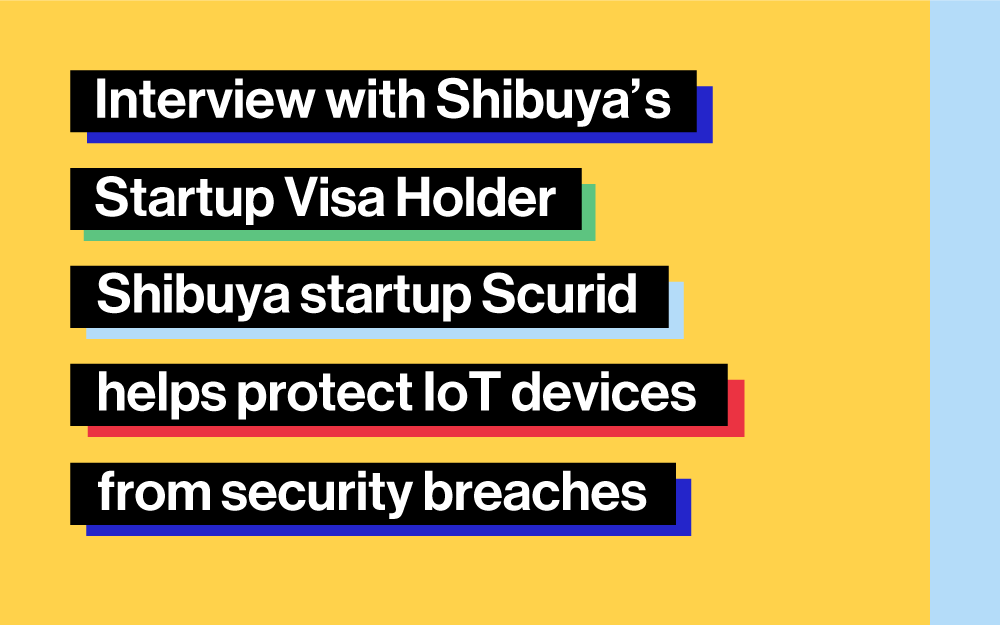Interview with Shibuya’s Startup Visa Holder: Shibuya startup Scurid helps protect IoT devices from security breaches

The story of Scurid started when Sushant Pandey, an IoT Architect with over 10 years of experience, decided to build a safer IoT ecosystem. Today he is a successful Shibuya Startup visa awardee ready to tap into Japan’s manufacturing and robotics IoT market.

Hi, Sushant! How did you come up with an idea for Scurid?
I was born and brought up in Delhi, India. In 2012, I moved to Germany to finish my MSc. Software Technology degree and in parallel took a job in the research lab that triggered my interest in distributed computing.
It is estimated that the number of IoT devices worldwide will triple to more than 25.4 billion IoT devices in 2030. But convenience and connectivity comes at a price, especially considering how much data these devices collect.
After graduating, I worked first for a software company having platforms for hardware manufacturers in Europe & elsewhere as an IoT Architect Consultant and later moved to an IoT systems architect position. During this I kept seeing the same problem coming up from several different sides — companies had difficulties in verifying and trusting information from IoT devices. I had the idea that if a simplified yet secure digital identity solution was available on the market, then businesses would be able to not only rapidly identify unauthorized or compromised devices and take appropriate action, but also be able to build trust in the data used for analytics & AI systems. This is how Scurid was born!
Shortly after, I registered the company in Singapore and spent six months building a minimum viable product. From there it just grew.

Cool! What is Scurid now?
Scurid is developing an embedded software stack for the B2B IoT environment that allows users to generate digital identities using blockchain & other secure technology. As of now, we are targeting devices that are autonomous in nature, for example smart home devices, robots in the factories & vehicles. Our mission is to help bring higher trust, safer device identity into the highly distributed environment of the Internet of Things.
Why did you decide to move to Japan?
There are multiple factors that impacted my decision to move my startup to Japan. From touchscreen vending machines to interactive robots, Japan is one of the leading markets in robotics and manufacturing IoT. In the post-COVID-19 scenario, Japan’s digital identity solutions market size is projected to grow and we want to be a pioneering company.
My research showed that Japan is lagging behind in terms of adopting security, when compared to say the US & the EU, regulations on digital identities for IoT devices. With the security risks posed by the devices rising, the Japanese government is considering mandating that all devices have identity to prevent unauthorized access.
A year ago I thought launching a startup in Japan would be impossible but after networking with local ecosystem players I realized that opportunities are endless. In July 2021, we secured our first customer in Tokyo which accelerated my plans to relocate.
Why did you apply for a Shibuya Startup visa?
I heard about the Shibuya Startup visa at the Business in Japan talk on Clubhouse where Miho Tanaka, a Startup Visa Lead, was introducing a new visa schema for founders. She was extremely helpful and patient with all the questions I had. Realizing that I’m not the first foreign founder in Japan gave me the necessary courage to leave my comfort zone and start connecting with startup people in Japan.
As a solo founder, you are always running against the wind with a parachute deployed behind. Shibuya Welcome Service cuts off that parachute and stops the wind so you can move forward faster. I’m getting everything from visa support and incorporating to introductions to advisors and mentors. This kind of environment is critical for those who want to set their company in a foreign country.
What did the process look like?
It took me around a week to collect all the necessary documents. After successfully submitting it, I had an assessment interview with a couple of Shibuya city officials and a Venture Capitalist. Afterwards, things moved fairly fast. I provided required documentation for obtaining a Certificate of Eligibility and Miho helped transfer it to the administrative scrivener who applied to the Immigration Bureau on my behalf. Once I get a Certificate of Eligibility, I will need to undertake a journey to the Japanese Embassy in the Ministry to apply for my Startup visa.
What are your next steps?
Funding and hiring would be priority tasks that I would like to achieve in the next 8 months. Of course our current focus on R&D will continue to grow, with us accepted into Microsoft for Startups & Google Cloud Platform for startups has provided a new set of boosters to Scurid. Since we already have two customers in Japan & in the EU and because we will soon be a Japanese startup, I need somebody with business experience in Japan who would be helping on the executive level. Our startup is bootstrapped but to support incoming requests and growth we will need some funding in the initial phase.
I’m very excited for the upcoming months and would like to thank Shibuya Welcome Service for the amazing package they provide.
Thank you Sushant and good luck with setting your startup in Japan!

